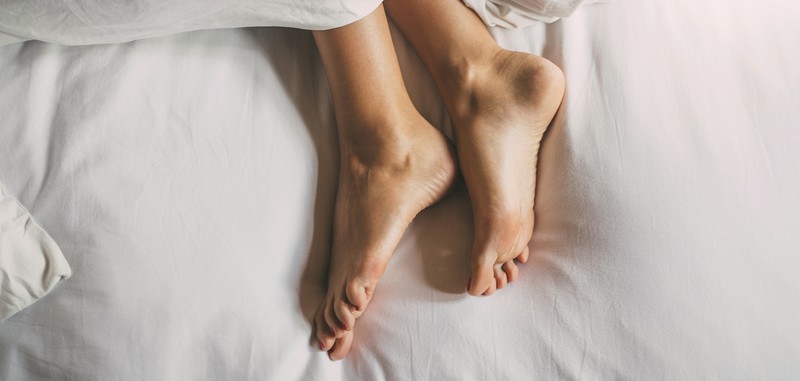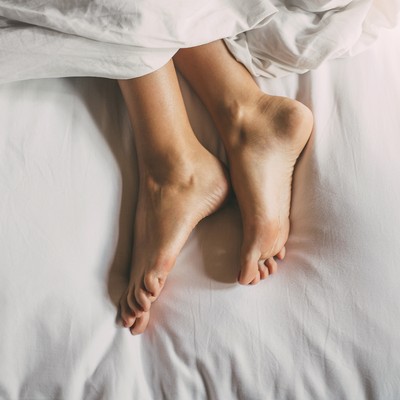

12 Natural Ways To Help You Sleep
Fionnuala Barnes, consultant psychologist for P3RFORM, says…
Rest Can Be Just As Powerful As Sleep
“If you’re having a bad night, it can be easy to get into a negative thought spiral but try to remember that just because you’re not asleep doesn’t mean your body is not recovering. Restful moments, where we can bring our heart rate down and go into a deep period of relaxation, are still important for our mental and physical wellbeing. It’s very easy to get caught up on the number of hours we have been asleep for, but focusing on shorter periods of higher quality sleep, interwoven with deeper periods of relaxation, is still helpful. Switching your mental approach from trying to sleep to trying to relax immediately evokes a different behavioural and cognitive response.”
Breathing Exercises Can Help
“If you wake up in the middle of the night and struggle to get back to sleep, it’s all about relaxing the body and mind. Engaging in mindful exercises can bring the body back into a state of relaxation. To support getting back to sleep, you’ll want to promote the activation of your parasympathetic nervous system, known as our rest and digest system, and reduce your ‘fight or flight’ system. Breathing exercises can be worth their weight in gold, especially when you focus on a longer exhale. Start by breathing in for a count which feels natural for you (this tends to be around four counts), and then make your out-breath longer than your in-breath (aim for around six counts). Doing this for a couple of minutes can quickly promote a state of relaxation.”
Mindfulness Doesn’t Have To Be Complicated
“You’ve probably read about the benefits of meditation for sleep and relaxation, but it doesn’t need to be anything fancy. Try practising by sitting in a quiet space, bringing a calm and soft focus to all your five senses. Work progressively through your senses and notice sounds, smells, noises, sights and any tastes. Try to pinpoint five things you can hear, three things you can smell and two things you can taste.”
Visit P3RFORM.co.uk
Thomas Høegh Reisenhus, sleep specialist & sleep counsellor for Tempur, says…
Your Need For Sleep Doesn’t Diminish With Age
“While it’s common for older adults to experience changes in the quality and duration of their sleep, contrary to what many people believe, the body’s need for sleep doesn’t change as you age. In fact, older people don’t need any less sleep than the average person, instead changes and disruptions to sleep patterns occur because of the ageing of a particular part of the brain called the SCN. The SCN controls our circadian rhythm – aka when we feel tired and alert – so deterioration of this directly impacts the quality and duration of sleep. Signs you aren’t getting enough sleep are also the same, regardless of age – feelings of irritability and low mood, having difficulty focusing or remembering things and caffeine cravings are signs you could be sleep deprived.”
Try A Different Way To Count Sheep
“With your eyes closed, imagine a blackboard in front of you. Write the number 100 in the centre of the board with a piece of chalk and draw a small circle around it. Write the word ‘deeper’ in big letters next to the circle you have just drawn. Then, carefully erase the number 100 with a sponge, taking care not to touch the circle with the sponge, before writing the number 99 inside the circle and once again write ‘deeper’ in the same spot as before, being careful not to write outside the letters already there. Then, repeat the process, so the next number in the circle will be 98, then 97 etc., all the way down to zero (you will fall asleep long before getting to zero), and each time writing ‘deeper’ in the same spot. This exercise requires all your attention, which prohibits your mind from wandering.”
Consider Eating Magnesium-Rich Foods
“Magnesium is a mineral that supports the production of GABA, a neurotransmitter that promotes sleep and regulates the body’s stress response. Before turning to supplements, ensure you are eating plenty of magnesium-rich foods – dark leafy greens such as kale and spinach, legumes, nuts, seeds and wholegrains are great sources. Adding magnesium powder to a hot drink before bed can also help.”
Visit Tempur.co.uk
Jenna Hope, registered nutrition consultant, says…
Caffeine Stays In Your System Longer Than You Think
“Caffeine lasts around four to six hours in the body, but it has a half-life of around five hours. This means that if you consume 200mg of caffeine (equivalent to a strong cup of coffee), after five hours, you’ll still have 100mg left in the body. In other words, if you drink a coffee at 4pm, by 10pm half of the caffeine will still be in your blood and impair your sleep. Caffeine inhibits the release of certain neurotransmitters responsible for helping us to feel calm and sleepy. If these can’t be activated, you’ll remain alert and wired. If you struggle with your sleep, try avoiding caffeine after 2pm.”
Try Sleep-Promoting Foods
“Melatonin is a sleep-inducing hormone, often referred to as the ‘sleep hormone’. Melatonin regulates your sleep-wake cycle and responds to light and darkness – more melatonin is produced when it gets dark to help you sleep, and less is produced as the sun rises and your eyes are exposed to light to help you wake up. Some foods contain precursors to melatonin and therefore may aid sleep. For example, the amino acid tryptophan is required to convert serotonin into melatonin – oats, chickpeas, tuna and milk are all good sources. Complex carbohydrates – think sweet potatoes and brown rice and pasta – also allow tryptophan to cross the blood brain barrier and support the production of melatonin.”
Giving The Body Time To Digest Is Key
“Try to avoid eating a large meal at least two to three hours before hitting the pillow. Melatonin is largely secreted and absorbed in the gut. However, if we’re digesting a heavy meal, the gut is working hard to metabolise your food, which in turn may impact melatonin secretion and absorption.”
Visit JennaHopeNutrition.com
Maeve O’Sullivan, TCM expert and co-founder of Escapada, says…
Swapping Wine For Beer Could Help
“If you like having a drink or two in the evening, ditch high percentage spirits and wines. Although alcohol can have a relaxing and heating effect (especially on the liver), in the long-term this can increase symptoms of irritability, inner agitation and sleep disorders. Instead, switch to a lower-alcohol white or red wine or, even better, beer. Hops have a cooling, soothing and mood-enhancing effect that won’t keep you awake.”
Falling Asleep Before 11pm Matters
“In Chinese medicine, the body’s various organs function and replenish themselves at different times of the day. During sleep, the gallbladder, which controls emotions and judgement, and the liver, which is responsible for circulation and emotional wellbeing, repair themselves. The later you fall asleep, the less chance you are giving your body to repair the energy reserves of these organs, which can lead to bad judgement and emotional instability. Aim to go to bed between 9-11pm to ensure your body can reset and replenish internally.”
The Right Pressure Point Can Induce Sleep
“Located behind the ear is an acupressure point called anmian, which translates to ‘peaceful sleep’. It’s often used by traditional Chinese medicine (TCM) practitioners to treat insomnia at home. It’s found between the back of the ear and the base of the skull, where there’s a slight depression next to a bone called the mastoid process. Place your finger on this depression and apply pressure in a circling motion to massage it each night before bed.”
Visit EscapadaHealth.com
DISCLAIMER: Features published by SheerLuxe are not intended to treat, diagnose, cure or prevent any disease. Always seek the advice of your GP or another qualified healthcare provider for any questions you have regarding a medical condition, and before undertaking any diet, exercise or other health-related programme.
DISCLAIMER: We endeavour to always credit the correct original source of every image we use. If you think a credit may be incorrect, please contact us at info@sheerluxe.com.

